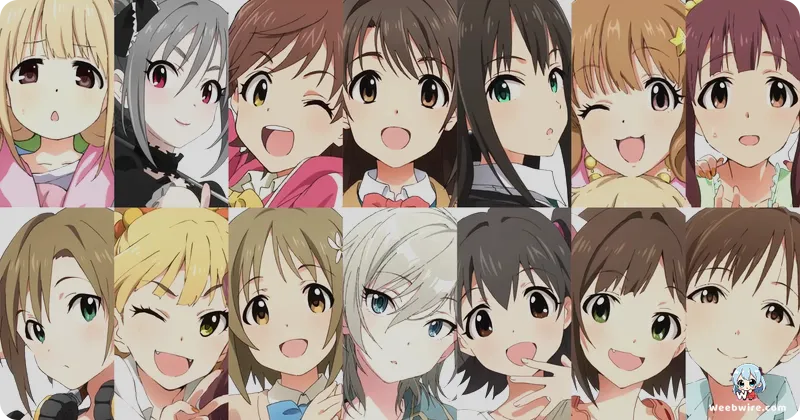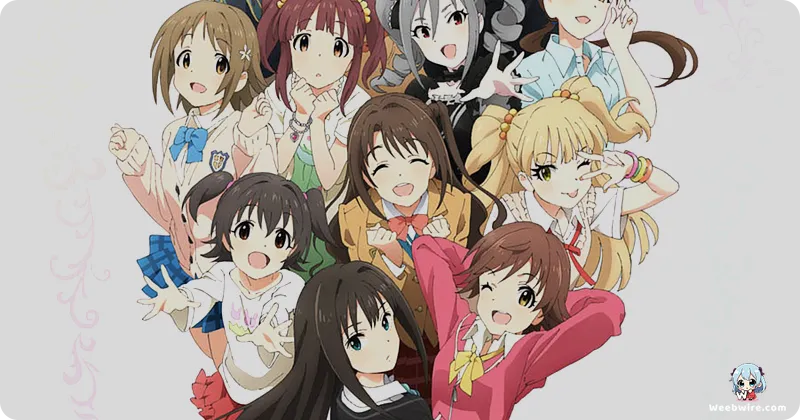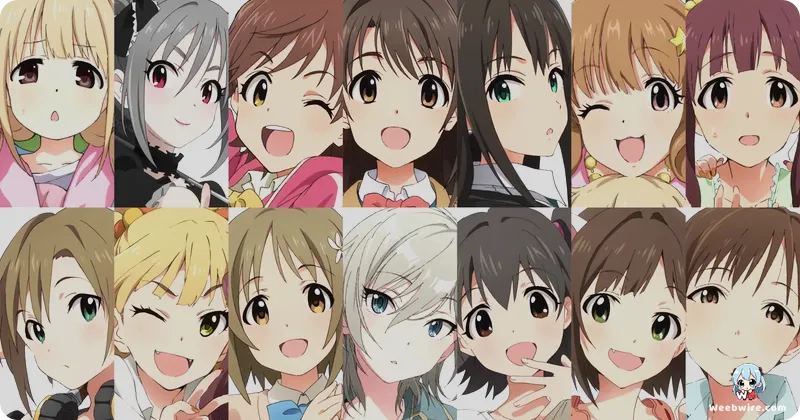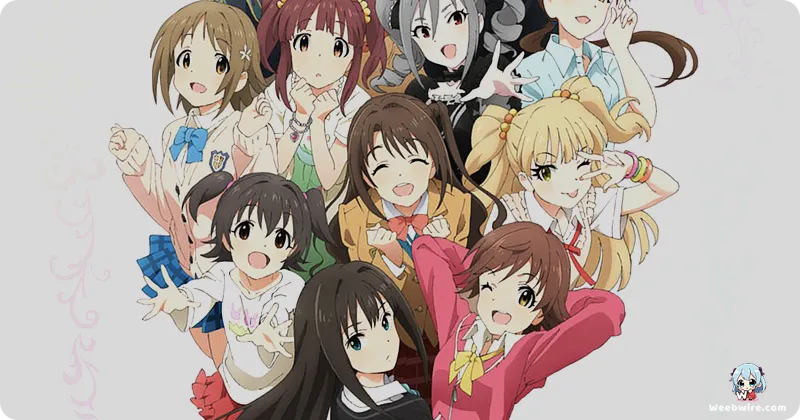Unveiling The Idol Master's Enduring Legacy: From Arcade Roots to Global Phenomenon

In the vibrant, ever-expanding universe of idol anime, few franchises command the enduring admiration and unique resonance of 'The Idol Master.' While its captivating performances and heartwarming narratives from 765 Production are well-known, a deeper exploration reveals a treasure trove of fascinating insights and a groundbreaking history that truly distinguish this series. Far from being merely another entry in the genre, the seminal 2011 anime adaptation by A-1 Pictures solidified its status as a foundational pillar, offering layers of depth for both devoted fans and curious newcomers alike. Let's embark on a journey behind the stage lights to uncover the delightful trivia that cements 'The Idol Master' as an unparalleled experience.
From Arcade Cabinets to Anime Stardom: A Pioneering Origin
At its very genesis, 'The Idol Master' didn't emerge as an anime or even a traditional console game, but as an innovative arcade title launched by Bandai Namco Games in 2005. This pioneering origin is paramount to grasping its singular allure. Players were invited to engage physically, inserting cards into arcade machines to meticulously manage their chosen idol's demanding schedule, rigorous lessons, and thrilling performances. This interactive, simulation-driven approach fostered an incredibly personal bond between the player and their virtual idol—a connection painstakingly translated onto the screen by the 2011 anime. The series' narrative, centered on the enigmatic 'Producer' from 765 Production, directly mirrors this player-centric viewpoint, allowing viewers to vicariously share in the triumphs and tribulations of nurturing burgeoning talent. This direct lineage from an immersive arcade experience stands as a rare gem in the anime landscape, profoundly influencing the series' narrative architecture and emotional depth.

The Heart of the Performance: Unwavering Seiyuu Dedication
A cornerstone of the franchise, often overlooked, is the profound dedication exhibited by its voice actors, or 'seiyuu,' who don't just lend their voices but genuinely embody their characters. These accomplished performers regularly grace live concerts, famously known as 'Live The@ter' events, where they sing iconic idol songs, don elaborate stage costumes, and interact with the audience as if they are the idols themselves. This seamless fusion of actor and character cultivates an unparalleled level of authenticity and fan engagement. Numerous seiyuu have eloquently spoken about their deep emotional connection to their characters' evolving journeys and struggles, often reflecting their own experiences within the demanding entertainment industry. This symbiotic relationship between the animated personas and their real-life counterparts infuses the franchise with an extraordinary dimension of realism, rendering the idols genuinely alive and their stories incredibly impactful.
Beyond Archetypes: Nuanced Character Development
Moreover, the anime's portrayal of the idols' individual challenges and growth is remarkably nuanced and true to life. While many idol series might present characters through readily identifiable archetypes, 'The Idol Master' delves into more intricate, often deeply relatable, personal obstacles. Take, for instance, the shy and reserved Yukiho Hagiwara, whose arduous journey to conquer her anxiety isn't merely a plot device but a gradual, sometimes frustrating, yet ultimately deeply rewarding arc. Similarly, the seemingly flawless Chihaya Kisaragi grapples with profound personal trauma linked to her family, a storyline handled with exceptional sensitivity and emotional gravitas. These meticulously crafted character arcs are intricately woven into the series' fabric, ensuring that each idol emerges as a distinct individual replete with their own aspirations, fears, and internal conflicts, rather than a mere compilation of charming traits. This unwavering commitment to character development elevates 'The Idol Master' beyond simple entertainment, transforming it into a compelling drama about self-discovery, perseverance, and the power of dreams.

A Symphony of Success: The Franchise's Musical Prowess
The sheer volume and exceptional quality of music created for 'The Idol Master' franchise are nothing short of astounding. Long before the 2011 anime debuted, the original arcade game and subsequent console releases spawned hundreds of original songs, each painstakingly composed to reflect the unique personality and emotional state of a specific idol or group. The anime adaptation masterfully integrated these existing tracks, alongside new compositions, into its unfolding narrative. Frequently, a song's lyrics or melody would perfectly underscore an idol's current emotional state or their journey toward overcoming a particular challenge. This exquisite synergy between music and storytelling is a defining hallmark of the series, rendering every performance not just a visual and auditory spectacle, but a pivotal moment in the characters' ongoing development. The music transcends mere background accompaniment; it is an indispensable component of the narrative, propelling character arcs forward and amplifying the emotional resonance of every scene.
Mastering the Ensemble: Balancing a Diverse Cast
Another captivating aspect lies in the anime's ingenious ability to balance a sprawling ensemble cast. With thirteen distinct idols populating 765 Production, it would be all too easy for some to fade into the background. However, 'The Idol Master' dedicates substantial screen time to each young woman, ensuring viewers gain a comprehensive understanding of their individual motivations, aspirations, and interpersonal relationships. The series adeptly shifts its focus, allowing dedicated episodes or narrative arcs to spotlight specific idols, thereby deepening our appreciation of their unique personalities and the obstacles they confront. This meticulous attention to character distribution prevents any single idol from eclipsing the others, fostering a genuine sense of a supportive, familial community within 765 Production. It stands as a testament to the masterful writing and direction that every idol, from the ebullient Haruka Amami to the stoic Makoto Kikuchi, feels fully realized and contributes profoundly to the overarching narrative.
The Enduring Legacy: A Dedicated Fan Community
Finally, the enduring and fervent fan culture surrounding 'The Idol Master' is a phenomenon unto itself. The anime's foundational arcade game roots instilled a powerful sense of participatory fandom, with enthusiasts often proudly identifying themselves as 'Producers'—a direct homage to the player's role in the original games. This distinctive identity cultivates a deep sense of ownership and community among fans, who actively engage in vibrant discussions, craft intricate fan art, and attend live events with an almost familial devotion. The series has cultivated a fiercely loyal following that celebrates not just the idols, but the entire transformative journey of 765 Production, making it far more than just an anime; it’s a shared odyssey of growth, music, and unwavering mutual support. This dynamic and dedicated fan base stands as irrefutable proof of the anime's unparalleled capacity to forge a truly immersive and emotionally resonant world, cementing 'The Idol Master' as a timeless masterpiece within the idol genre. Its exquisite blend of heartfelt drama, infectious music, and profoundly developed characters continues to enthrall audiences worldwide, unequivocally demonstrating that the magic of 765 Production is, indeed, everlasting.

Credits
The Idol Master
Author
Bandai Namco Games
Cover Art
Atsushi Nishigori
Studio
A-1 Pictures
Publisher
Bandai Namco Entertainment
Producers





